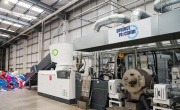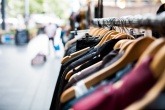Fashion retailers to explore circular business models
The London Waste and Recycling Board (LWARB) and circular economy consultants QSA Partners have announced that they are working with a number of fashion retailers to develop and pilot new circular economy business models, aiming to promote clothes hire, product resale, repair and rental services.
Announced yesterday (30 May), the organisations will be working with retailers including Farfetch, Ted Baker and new brand FW through the Circular Fashion Fast Forward project, with each retailer exploring and developing their own approach to becoming a more circular business. The project will be funded by the C&A Foundation, a corporate organisation supporting the transition to a circular economy for fashion.
 “The fashion industry needs to rapidly adopt new business models that increase the use of clothing and stop the use of unsustainable materials,” says Megan McGill, Programme Manager for the C&A Foundation. “This is a critical step towards a circular fashion sector. The Circular Fashion Fast Forward project and the participating brands will demonstrate what can already be done today and inspire more industry players to follow.”
“The fashion industry needs to rapidly adopt new business models that increase the use of clothing and stop the use of unsustainable materials,” says Megan McGill, Programme Manager for the C&A Foundation. “This is a critical step towards a circular fashion sector. The Circular Fashion Fast Forward project and the participating brands will demonstrate what can already be done today and inspire more industry players to follow.”
The fashion industry is a significant part of the UK economy, contributing £28.1 billion to national GDP in 2015. It also produces a large amount of waste, with consumers throwing away one million tonnes of textiles every year, 300,000 tonnes of which ends up in the household waste stream.
The high turnover of clothing is largely attributed to ‘fast fashion’, which sees retailers sell cheap clothing with short lifespans, encouraging consumers to purchase new items rather than make existing ones last. The Circular Fashion Fast Forward Project aims to move retailers away from this approach, creating case studies that will be shared once the project is completed to help other fashion retailers to adopt their own circular business models.
With awareness of the environmental impact of the fashion industry on the rise – Parliament’s Environmental Audit Committee launched an inquiry into the sustainability of the industry in June last year, and called for a one pence producer responsibility fee to be paid by fashion brands and retailers on each item of clothing they sell to fund better textile collection – businesses are opening their eyes to the opportunities afforded to them by going circular.
Resale is an increasingly fertile market for businesses, with a recent report by online thrift store thredUP putting the global value of the second-hand market at $24 billion (£19 billion), a figure that is expected to double in the next five years. Furthermore, a Business of Fashion report, ‘The state of fashion 2019’, highlights that resale is growing nine times faster than traditional retail, while the Ellen MacArthur Foundation estimates that an industry-wide move towards circular fashion could add €160 billion (£141.3 billion) in value to the global economy by 2030.
Resale and extending the life of products are certainly key motivations for the participating retailers, with Thomas Berry, Director of Sustainable Business at Farfetch, saying: “Circular models like resale or rental are big commercial opportunities for Farfetch. They are a very natural extension of our long-standing vintage offer, and we have started to pilot a few new models. Since 2018 our Browns retail store has been in partnership with rental platform Armarium, and we have just launched Farfetch Secondlife, a handbag resale service for our customers. We are excited to be working with LWARB and QSA to build the business case to accelerate our work in this area.”
Anna Smoothy, Senior Marketing Manager at new outerwear brand FW, added: “FW’s approach to sustainability is an open-ended conversation. We are constantly searching to refine our materials and reduce our impact. At FW, quality is sustainability. We make products to last while incorporating eco-materials that are proven to be durable like Oxford Recycled Yarn. We are not just making eco-friendly products destined for landfill – we would like to underline the fact that we are developing a Repair Program with QSA and LWARB so that our fans invest in FW for life.” 





